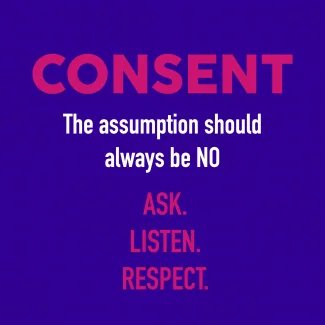Authors: Nan Fletcher-Lloyd, Nathalie Podder and Philippa Saunders
You may have seen some posts recently on the power of consent and why it is important. If you are a committee member of a club, society or project (CSP), you may also have completed the consent awareness training rolled out by the Union.
This is all part of a wider campaign ICUsToo are running in partnership with the Union to raise awareness about what consent is, why it’s important and how to create a culture of consent at Imperial.
In our recent social media posts, we discuss 5 key elements to consent: full, informed, continued, given without duress, and not when intoxicated.
Full
Full consent occurs when both parties are willing and active participants. This is different from being passive and giving in; everyone involved must be enthusiastic.
We gave the example of an individual who was in a relationship and wanted to have sex with their partner, but their partner did not seem enthusiastic and was physically and/or verbally hesitant. This is not consent because active, enthusiastic participation was missing. Being in a relationship does not entitle someone to sex, and it does not negate the need for consent. Consent should be given explicitly and you always need to ask for consent, regardless of your relationship status or history with the other person.
Informed
Informed consent occurs when both parties make a choice while they are aware of all the relevant information that might influence their decision to provide consent. These include but are not limited to relationship status and sexual health.
The example we used was an individual about to have sex with a person who has agreed to have sex with you but whom they have failed to inform that they have an STI. This is not informed consent, as it leaves the other person unaware of the risks that are posed to their own health. Had they known about the STI they may have made a different choice regarding protection, or said no. If they do decide to go ahead and use protection, then their consent would only be present on that condition.
Continued
Continued consent occurs when both parties provide reaffirmation of consent throughout, and especially in the event of any changes.
We used the example of an individual who had been having sex with a consenting party but who then wanted to change things up. In this situation, communication is key. Decisions to change anything should always be made together. Ask first, never assume. Continued consent also means getting into the habit of checking in with the other person and making sure they are comfortable and still wish to continue. It is also important to check in with yourself and ask yourself how comfortable you are with what you are doing.
Given without duress
Consent given without duress occurs when both parties agree freely, without feeling pressured, threatened, or intimidated. These are acts of coercion.
We showed the example of an individual who been seeing someone and told that person they would stop seeing them if they did not have sex with them. This action is pressurizing, and it also threatens the other party with a consequence should they decide not to have sex, which impacts the ability of that party to give consent freely.
Additionally, if one party is in a vulnerable position, for example they are in an unsafe environment or are recovering from a recent traumatic event, it is important to check in with yourself and make sure they feel comfortable enough around you to say no.
Not when intoxicated
Consent should be given when both parties are free from the influence of any substance that might cause impairment in judgement.
Our example concerned an individual who met someone on a night out with whom they had been getting along well and wanted to have sex with but said individual realized the other person was very drunk. Alcohol and other substances such as recreational drugs are all capable of causing impaired judgment and some people may be more affected than others by the same level of consumption. In these situations, even if they do say yes, a person might not be aware of what they are consenting to.
But consent is not just about sex.
Consent should be the foundation of every interaction and relationship we ever have. So why do so many of us so feel a sense of guilt or embarrassment when saying no or setting boundaries?
We live in a culture where it seems to be commonplace to make assumptions and in which we normalize a lack of consent. But when it comes to consent, the assumption should always be no.
So, this is our call to action. Ask for consent. Listen for consent. Respect consent.
If you are interested in joining ICUsToo's working committee, please complete this form.
